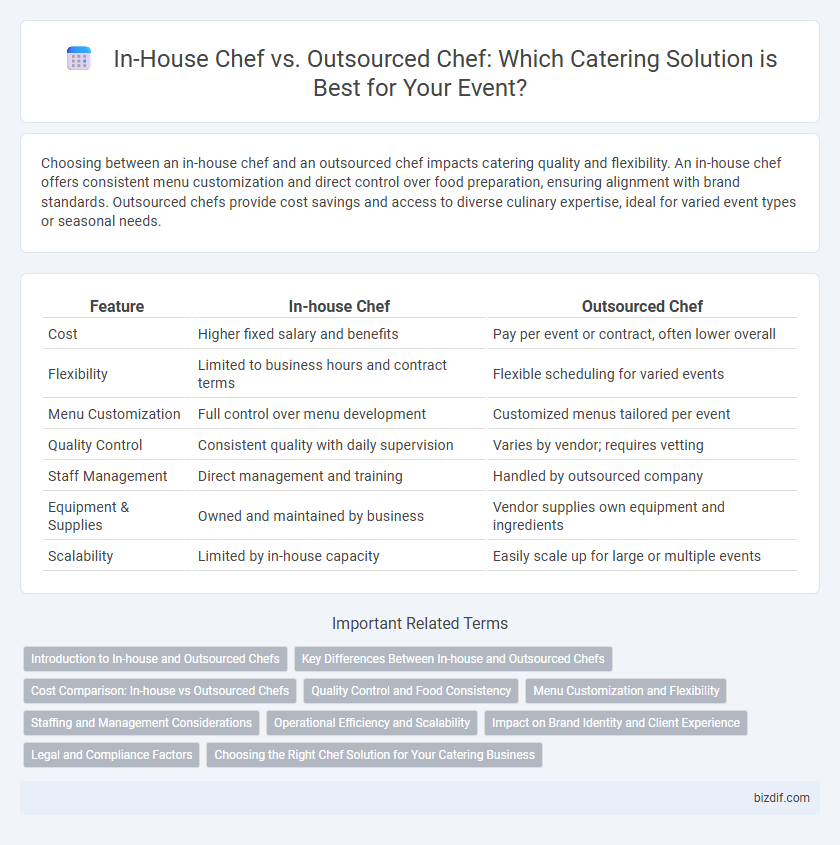Choosing between an in-house chef and an outsourced chef impacts catering quality and flexibility. An in-house chef offers consistent menu customization and direct control over food preparation, ensuring alignment with brand standards. Outsourced chefs provide cost savings and access to diverse culinary expertise, ideal for varied event types or seasonal needs.
Table of Comparison
| Feature | In-house Chef | Outsourced Chef |
|---|---|---|
| Cost | Higher fixed salary and benefits | Pay per event or contract, often lower overall |
| Flexibility | Limited to business hours and contract terms | Flexible scheduling for varied events |
| Menu Customization | Full control over menu development | Customized menus tailored per event |
| Quality Control | Consistent quality with daily supervision | Varies by vendor; requires vetting |
| Staff Management | Direct management and training | Handled by outsourced company |
| Equipment & Supplies | Owned and maintained by business | Vendor supplies own equipment and ingredients |
| Scalability | Limited by in-house capacity | Easily scale up for large or multiple events |
Introduction to In-house and Outsourced Chefs
In-house chefs are culinary professionals employed directly by an organization, providing consistent menu customization and immediate kitchen supervision. Outsourced chefs operate through external catering services or agencies, offering flexibility and specialized cuisine options without long-term employment commitment. Choosing between in-house and outsourced chefs impacts cost management, food quality control, and operational scalability in catering services.
Key Differences Between In-house and Outsourced Chefs
In-house chefs offer consistent menu control, personalized service, and deeper integration with the brand's culinary vision, ensuring quality and customization tailored to the establishment's needs. Outsourced chefs provide flexibility, cost savings on benefits and staffing, and access to specialized culinary expertise without long-term commitments. Key differences include employment status, cost structure, operational control, and scalability, influencing decision-making based on budget, culinary goals, and business model.
Cost Comparison: In-house vs Outsourced Chefs
In-house chefs typically involve fixed costs such as salaries, benefits, and training, which can increase overall expenses despite offering consistent control over menu quality. Outsourced chefs often reduce costs by eliminating benefits and administrative fees, providing flexibility and scalability based on event size or frequency. Evaluating cost comparison for catering requires analyzing volume, event types, and the balance between control and operational expenses to determine the most efficient staffing solution.
Quality Control and Food Consistency
In-house chefs provide greater quality control and consistent food standards by maintaining direct supervision over ingredient sourcing, preparation methods, and presentation. Outsourced chefs may introduce variability due to differing protocols and less frequent oversight, impacting food consistency and brand reputation. Implementing rigorous quality control measures and standardized recipes is essential to ensure uniformity regardless of staffing choices.
Menu Customization and Flexibility
In-house chefs offer unparalleled menu customization and flexibility, allowing real-time adjustments based on guest preferences and seasonal ingredients. Outsourced chefs often work with pre-set menus, limiting spontaneity but providing specialized cuisine expertise. Choosing between the two hinges on prioritizing personalized service versus specialized culinary skills for catering events.
Staffing and Management Considerations
In-house chefs provide consistent control over menu customization and kitchen operations, ensuring alignment with brand standards and immediate responsiveness to client needs. Outsourced chefs offer flexibility in staffing, reducing overhead costs and enabling access to specialized culinary skills without long-term commitments. Effective management requires balancing the stability of in-house teams with the adaptability and cost-efficiency of outsourced talent to optimize service quality and operational efficiency in catering.
Operational Efficiency and Scalability
In-house chefs offer tailored control over menu quality and consistency but require fixed labor costs and limit scalability during peak demand. Outsourced chefs provide flexible staffing solutions, reducing overhead and enabling rapid scaling for large or fluctuating events. Operational efficiency improves with outsourced chefs by leveraging specialized expertise and adaptable resources, while in-house teams may better integrate with core staff culture for ongoing culinary innovation.
Impact on Brand Identity and Client Experience
In-house chefs immerse themselves fully in a company's culture, providing personalized menu creations that strengthen brand identity and ensure consistent quality. Outsourced chefs offer flexibility and access to diverse culinary expertise but may lack the deep brand alignment that fosters client loyalty. Choosing between in-house and outsourced chefs directly influences client experience through menu authenticity, service consistency, and the alignment of food presentation with brand values.
Legal and Compliance Factors
In-house chefs are directly employed by the catering company, requiring strict adherence to labor laws, employee benefits, and workplace safety regulations under local employment standards. Outsourced chefs operate as independent contractors or through third-party agencies, shifting compliance responsibilities to contract terms and vendor agreements, which must explicitly outline liability, insurance, and certification requirements. Ensuring proper food safety certifications, workers' compensation coverage, and adherence to health codes is critical for both arrangements to mitigate legal risks and maintain operational compliance.
Choosing the Right Chef Solution for Your Catering Business
Choosing the right chef solution for your catering business depends on factors such as budget, menu complexity, and control over culinary quality. In-house chefs offer consistency and direct oversight, ideal for venues with regular, customized menus, while outsourced chefs provide flexibility and cost efficiency for events with varying culinary requirements. Evaluating client preferences, event scale, and operational logistics ensures a strategic decision that enhances service delivery and customer satisfaction.
In-house Chef vs Outsourced Chef Infographic

 bizdif.com
bizdif.com